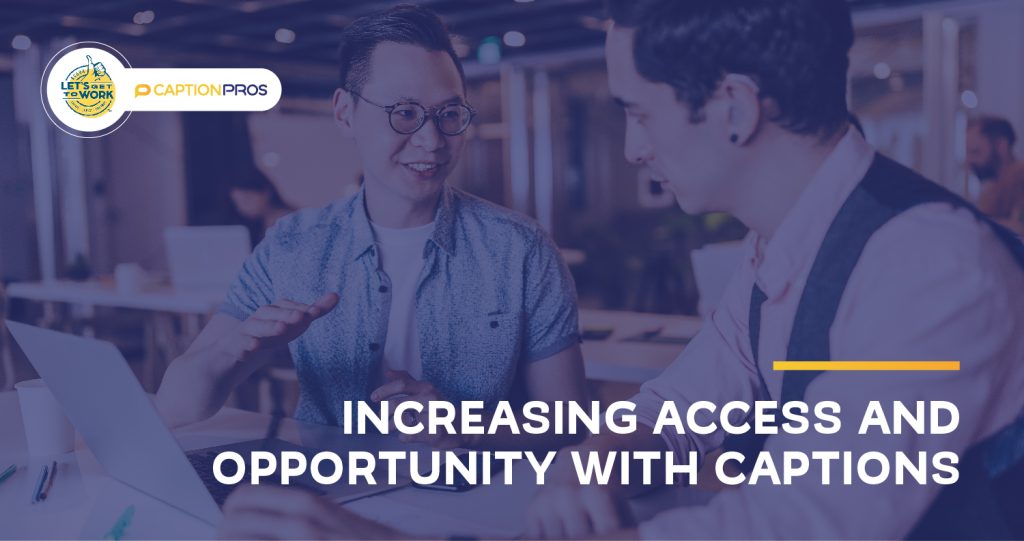Workplaces that welcome the talents of all people, including people with disabilities, are a critical part of building a diverse and inclusive community that enhance access and opportunity.
For people with hearing loss, it can be difficult to find the right employment fit. The Deaf and the Hard of Hearing community faces many challenges, including unemployment and underemployment, pay inequality, and early termination. The coronavirus pandemic has created additional barriers due to mask mandates and a shift to remote work.
Workplaces and employers have a responsibility to provide appropriate accommodations for communication. Professional captioning services are one solution to this barrier.
Hearing loss is the leading disability in the workplace
October is National Disability Employment Awareness Month, dedicated to raising awareness about disability employment issues. This marks the nation’s 75th observance of NDEAM, and the 2020 theme is “Increasing Access and Opportunity.”
The campaign also celebrates the contributions of workers with disabilities and encourages equal access, inclusion, and accommodations on the job.
Those who may have hidden their hearing loss from employers and coworkers by reading lips face new challenges due to the pandemic. It’s harder to hear people talking through a mask and makes reading lips impossible. In addition, teleconferences pose issues with sound and video quality.
Ambulatory, hearing, and cognitive impairments are the most common disabilities among workers with a disability, according to the US Census Bureau. That’s especially concerning when considering some of the top-ranked occupations for younger workers (ages 16 to 44) and older workers (age 60 and older) with a disability. They include:
- Cashiers
- Secretaries and administrative assistants
- Personal care aides
- Registered nurses
- Customer service representatives
- Retail workers
- Service industry employees
Since people with a hearing impairment are more likely to work than people with other disability types, it is crucial they receive the right equipment and accommodations to successfully do their jobs. Captioning services are even more important now that many professional workers – teachers, lawyers, sales managers, even chief executive officers – are using video conferencing software to communicate with colleagues and attend virtual conferences.
Captioning increases access for everyone
To meet accommodation requirements, all video content shown during virtual meetings or conferences should have captioning or an available transcript. Companies also should record online meetings and make them available so attendees can re-watch anything they missed. This could be due to hearing or a visual impairment, technology issues, or spotty internet connections.
The use of qualified, certified captioners like Caption Pros can help address these accessibility issues:
- Remote CART captioning streams words directly to the Internet for instant reading.
- Realtime speech-to-text translation for meetings and events can be broadcast via a webcast or integrated into your company’s website.
- Instant transcription of an audio file, video file, or live event or news conference can be easily shared with employees, clients, and stakeholders.
- Providing instantaneous speech to text enhances accessibility for all participants. Research shows video captions benefit everyone.
- Best practices call for employers to use a quality captioning company that follows industry standards. Caption Pros provides fast and accurate captioning and transcription services.
- Apps, programs, and online video conferencing platforms that provide auto-generated captions or automatic transcriptions may seem more cost-effective, but they have a high error rate and are not considered equitable access.
- Captions overlaid on the video, if done well, reduce split visual attention.
- Some videoconferencing systems have hard-to-read caption defaults.
- Text chat is a critical feature for participants to alert hosts to accessibility problems and receive responses.
- Professional captioners can work directly with deaf and hard of hearing employees to address concerns with home work stations or other accessibility issues.
- Companies receive personalized service, help with technical issues, and general consultation on how to resolve accessibility issues for employees or customers with hearing loss.
‘Let’s Get to Work’ campaign
In Arizona, where Caption Pros is located, the Arizona Commission for the Deaf and Hard of Hearing has launched the Let’s Get to Work initiative to “engage, employ, and empower” and address workplace inequalities.
There are legal issues related to hiring and employing people with hearing loss or deafness. The Americans With Disabilities Act (ADA), Rehabilitation Act, and state employment laws explain the rules and regulations employers are required to follow. There are a variety of resources available to companies, including tax credits, that can help employers offset costs associated with complying with applicable laws.
The Let’s Get to Work campaign encourages employers to invest in diverse talent, including deaf and hard of hearing employees. By recognizing the unique skills they bring to the workplace, employers increase access, opportunity, and economic security that come with gainful employment. They also serve as role models for equity, inclusion, and social responsibility.
Caption Pros’ owner Jennifer Schuck is a dedicated advocate for enhancing accessibility for people with hearing loss. Reach out to us to learn more about our award-winning captioners and services to meet the needs of all of your employees and customers.







